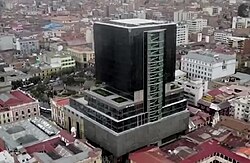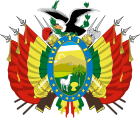
Back Asamblea Llexislativa Plurinacional de Bolivia AST Assemblea Legislativa Plurinacional de Bolívia Catalan Plurinationale Lovgivende Forsamling Danish Plurinationale Legislative Versammlung Boliviens German Πολυεθνοτική Νομοθετική Συνέλευση Greek Asamblea Legislativa Plurinacional de Bolivia Spanish Batzar Legegile Plurinazionala Basque Assemblée législative plurinationale French Majelis Legislatif Plurinasional ID 多民族立法議会 Japanese
16°29′46″S 68°07′59″W / 16.49611°S 68.13306°W
Plurinational Legislative Assembly Asamblea Legislativa Plurinacional | |
|---|---|
 | |
| Type | |
| Type | |
| Houses | Chamber of Senators, Chamber of Deputies |
| History | |
| Founded | 1825 unicameral, 1831 bicameral |
| Leadership | |
President of the Plurinational Legislative Assembly (ex oficio as Vice President) | |
| Structure | |
| Seats | 166 36 Senators 130 Deputies |
 | |
Chamber of Senators political groups | Government (21):
MAS-IPSP (21) Opposition (15): |
 | |
Chamber of Deputies political groups | Government (75):
MAS-IPSP (75) Opposition (55): |
| Elections | |
Chamber of Senators voting system | Party-list proportional representation |
Chamber of Deputies voting system | Seat linkage mixed compensatory mixed system (MMP) |
Last Chamber of Senators election | 18 October 2020 |
Last Chamber of Deputies election | 18 October 2020 |
Next Chamber of Senators election | 2025 |
Next Chamber of Deputies election | 2025 |
| Meeting place | |
 | |
| New headquarters of the Plurinational Legislative Assembly La Paz, Bolivia | |
| Website | |
| https://web.senado.gob.bo/ http://www.diputados.bo | |
 |
|---|
|
|
The Plurinational Legislative Assembly (Spanish: Asamblea Legislativa Plurinacional) is the national legislature of Bolivia, placed in La Paz, the country's seat of government.
The assembly is bicameral, consisting of a lower house (the Chamber of Deputies or Cámara de Diputados) and an upper house (the Chamber of Senators, or Cámara de Senadores). The Vice President of Bolivia also serves as the ex officio President of the Plurinational Legislative Assembly. Each house elects its own directorate: a President, first and second Vice Presidents, and three or four Secretaries (for the Senate and the Chamber of Deputies, respectively). Each party is said to have a seat (Spanish: bancada) consisting of its legislators. The representatives of each department comprise a brigade (brigada). Each house considers legislation in standing committees.
The Chamber of Senators has 36 seats. Each of the country's nine departments returns four senators elected by proportional representation (using the D'Hondt method).[1] (From 1985 to 2009, the Senate had 27 seats: three seats per department: two from the party or formula that receives the most votes, with the third senator representing the second-placed party.) Senators are elected from party lists to serve five-year terms, and the minimum age to hold a Senate seat is 35 years.
The Chamber of Deputies comprises 130 seats, elected using a seat linkage based mixed compensatory system (for mixed-member proportional representation): 70 deputies are elected to represent single-member electoral districts, 7 of which are Indigenous or Campesino seats elected by the usos y costumbres of minority groups, 60 are elected from party lists on a departmental basis.[1] Deputies also serve five-year terms, and must be aged at least 25 on the day of the election. Party lists are required to alternate between men and women, and in the single-member districts, men are required to run with a female alternate, and vice versa. At least 50% of the deputies from single-member districts are required to be women.
Both the Chamber of Senators, and the proportional part of the Chamber of Deputies is elected based on the vote for the presidential candidates, while the deputies from the single-member districts are elected separately.[1]
The legislative body was formerly known as the National Congress (Spanish: Congreso Nacional).
- ^ a b c "Bolivia: Ley del Régimen Electoral, 30 de junio de 2010". Lexivox. Retrieved 10 February 2015.